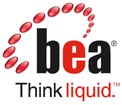
Sun Microsystems, Inc. was an American company that sold computers, computer components, software, and information technology services and created the Java programming language, the Solaris operating system, ZFS, the Network File System (NFS), and SPARC. Sun contributed significantly to the evolution of several key computing technologies, among them Unix, RISC processors, thin client computing, and virtualized computing. Sun was founded on February 24, 1982. At its height, the Sun headquarters were in Santa Clara, California, on the former west campus of the Agnews Developmental Center.

BEA Systems, Inc. was a company specialized in enterprise infrastructure software products which was wholly acquired by Oracle Corporation on April 29, 2008.

UnixWare is a Unix operating system. It was originally released by Univel, a jointly owned venture of AT&T's Unix System Laboratories (USL) and Novell. It was then taken over by Novell. Via Santa Cruz Operation (SCO) it went on to Caldera Systems, Caldera International, and The SCO Group before it was sold to UnXis. UnixWare is typically deployed as a server rather than a desktop. Binary distributions of UnixWare are available for x86 architecture computers. UnixWare is primarily marketed as server operating system.

OpenText Corporation is a Canadian company that develops and sells enterprise information management (EIM) software.
The Bread Board System (TBBS) is a multiline MS-DOS based commercial bulletin board system software package written in 1983 by Philip L. Becker. He originally created the software as the result of a poker game with friends that were praising the BBS software created by Ward Christensen. Mr. Becker said he could do better and founded eSoft, Inc. in 1984 based on the strength of TBBS sales.
VBBS is an acronym for Virtual Bulletin Board System. It was a shareware bulletin board system (BBS) for DOS that was conceived by Roland De Graaf in 1990. Written from scratch in QuickBASIC, it developed a loyal following. Originally it was a door for WWIV, but quickly grew into an original BBS concept on its own. By 1993, there were thousands of computers running VBBS around the world. VirtualNET, the largest VBBS message network, had close to 1500 members by version 6.14 in 1993.

The Major BBS was bulletin board software developed between 1986 and 1999 by Galacticomm. In 1995 it was renamed Worldgroup Server and bundled with a user client interface program named Worldgroup Manager for Microsoft Windows. Originally DOS-based, two of the versions were also available as a Unix-based edition, and the last versions were also available for Windows NT-based servers.

FirstClass is a client–server groupware, email, online conferencing, voice and fax services, and bulletin-board system for Windows, macOS, and Linux. FirstClass's primary markets are the higher-education and K-12 education sectors, including four of the top ten largest school districts in the United States.
A Web Map Service (WMS) is a standard protocol developed by the Open Geospatial Consortium in 1999 for serving georeferenced map images over the Internet. These images are typically produced by a map server from data provided by a GIS database.
RelayNet was an e-mail exchange network used by PCBoard bulletin board systems (BBS's). By 1990, RelayNet comprised more than 200 bulletin board systems.
TeleFinder is a Macintosh-based bulletin-board system written by Spider Island Software, based on a client–server model whose client end provides a Mac-like GUI. It appears to be the first such system on any platform, predating Apple's own AppleLink, as well as other Mac-based BBS systems like FirstClass. In more recent years the product has added a complete suite of "sub-servers" for popular internet protocols.
An offline reader is computer software that downloads e-mail, newsgroup posts or web pages, making them available when the computer is offline: not connected to the Internet. Offline readers are useful for portable computers and dial-up access.
Mustang Software, Inc. was a California-based corporation that developed telecommunications software products. Mustang was incorporated in 1988, became a public corporation in 1995, and was finally merged into Quintus Corporation in 2000.

Info-Mac is an online community, news aggregator and shareware file hosting service covering Apple Inc. products, including the iPhone, iPod and especially the Macintosh. Established in 1984 as an electronic mailing list, Info-Mac is notable as being the first online community for Apple's then-new Macintosh computer. Info-Mac was the dominant Internet resource for Mac OS software and community-based support throughout the 1980s and early 1990s.
Searchlight BBS is a bulletin board system (BBS) developed in 1985 by Frank LaRosa for the TRS-80. LaRosa formed a company, Searchlight Software, through which he marketed and sold Searchlight BBS. In 1987, LaRosa expanded the software and sold it as shareware written for the PC in Pascal. The features of Searchlight BBS included a full screen text editor, a remote DOS shell, and file transfer via the XMODEM protocol. Searchlight BBS rapidly grew in popularity, and appeared frequently in Boardwatch magazine and at BBS conventions across the United States. Eventually, Searchlight BBS supported FidoNet, ZMODEM, Internet e-mail and telnet connectivity.
Micro Focus International plc is a multinational software and information technology business based in Newbury, Berkshire, England. The firm provides software and consultancy. The company is listed on the London Stock Exchange and is a constituent of the FTSE 100 Index.
IDERA, Inc. is a software company that provides systems and application management software for Microsoft Windows and Linux servers. It is headquartered in Houston, Texas and has offices in Australia, Austria, and the United Kingdom. Idera focused on managing and monitoring servers and applications for smaller and mid-size companies. It is owned by the private equity firms HGGC and TA Associates.








